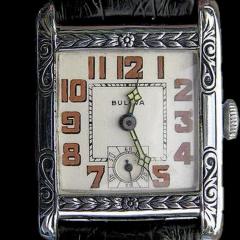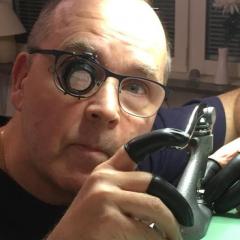-
Recently Browsing
- No registered users viewing this page.
-
Topics
-
Posts
-
As I'm only cleaning watches in small numbers at home, I pre-clean any significant deposits of old grease and oil before using the cleaning solutions. I scrape off deposits with pegwood and Rodico, and if really dirty, wash parts in naphtha with a brush. So I'm happy using DX, but can understand why it's avoided by the pros.
-
By Neverenoughwatches · Posted
I think attaching a nut to the lid to pull it off is the least destructive, any damage damage on the outside is going to an easier fix than any created when trying to push it out from the inside. Scratching up the inside of the lid , mainspring or arbor bearing will be risk. Just my opinion. -
yes the things we read in the universe I did see some where it was either difficult to clean off or it contaminated the cleaning fluid there was some issue with cleaning. I was trying to remember something about grease where as opposed to a substance of a specific consistency they were suggesting it had a base oil with something to thicken it. That conceivably could indicate that the two could separate and that would be an issue. But there is something else going on here that I had remembered so I have a link below and the description of the 9501 notice the word that I highlighted? Notice that word appears quite a bit on this particular page like 9415 has that property all so they 8200 mainspring grease and that definitely has to be mixed up when you go to use it because it definitely separates. just in case you didn't remember that nifty word there is a Wikipedia entry. https://en.wikipedia.org/wiki/Thixotropy https://www.moebius-lubricants.ch/en/products/greases I wonder if what you're seeing is the boron nitride left behind after cleaning. In other words it's the high-pressure part of the grease and it's probably embedding itself into the metal which is why it doesn't clean off and shouldn't be a problem?
-
Yes and no. I use Moebius 9501 synthetic grease and it is significantly runnier than the Moebius 9504 synthetic grease (and I assume Molykote DX) that I previously used. I haven't seen 9504 spread and it is in my opinion the best grease money can buy. However, my current method of cleaning doesn't remove it from the parts, so that's why I have decided to use the 9501 instead. I believe I read somewhere that Molykote DX too is difficult to clean off. Thinking about it, I'm pretty sure my 9501 grease which expired in June 2022 is runnier now than it was when it was new, but whether new or old it always needs to be stirred before use. So, that's why I treat the parts of the keyless works, cannon pinion, etc. with epilame. That was very thoughtful of you and something that had completely passed me by. Not sure what the epilame will do when it wears off in a non-oiled hole. Anyone?
-
By watchweasol · Posted
Hi not found one either yet, close relative is the 436 and 4361 according to ranff.db. It gives quire a lot of detail but not as good as the old site. RANFF.DB.
-









Recommended Posts